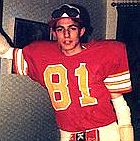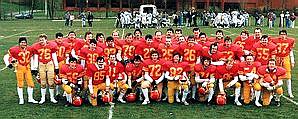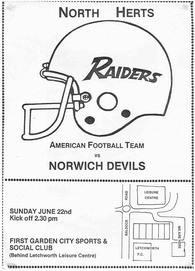6 June 2000
I have a confession to make. I am a New Orleans Saints fan.
I admit this is an unlikely thing to declare to the world, rather akin to standing up in a crowded room and shouting “I have haemorrhoids and man do they itch right now”. After all, weren’t the Saints the team whose fans went to matches with paper bags over their heads so that they wouldn’t be recognised on TV as supporters? The team that was despairingly renamed the Ain’ts by the self-same fans because of its ineptness? The team that allowed the sublime genius of Archie Manning to be battered into submission by endless years of non-existent pass protection?
Can’t deny it, but what can I say? When you’re a fan you don’t choose a team, it chooses you. You feel the blood stir when they score and there you are, stuck with them. And anyway, I share a birthday with Ricky Jackson, so that settles it.
Impenetrably American
But it’s not only my choice of team that’s unlikely: the fact that I support one at all is, on reflection, somewhat odd. After all football is the most impenetrably American sport in the world, your equivalent of our cricket. And how often do the good citizens of Spokane, Washington, erupt with controversy over the merits of Glamorgan County Cricket Club? Do they really care in Albuquerque whether or not Brian Lara captains the West Indies? I think not. I once saw some of the Dallas Cowboys taken to the Oval for a cricket match. They couldn’t get it at all – the same guys playing for five days solid, dressed smart enough to go out on the town afterwards? Weird.
So why doesn’t the reverse hold true?
It’s some time now since the boom in British American Football, the cumbersome name invented to get round the fact that to us football means soccer and a gridiron is something you cook on. Things have gone a bit quiet. But the glory years of the game over here saw an explosion in teams like you wouldn’t believe. From a standing start just about every town in England, and a great many in Scotland and Wales, produced its own team and joined a league within about a year and a half.

The team I got sucked into, as a particularly puny 17-year-old growing up in a small Hertfordshire market town, was called the North Herts Raiders. We weren’t England’s only Raiders, there was another team of the same name in Crawley although we never played against each other. At one time during those years I sat down and worked out how many of the (then) 28 NFL teams had had their names ripped off by British teams. The answer was almost all of them.
I never saw a Bills or a 49ers, but we had a Thames Valley Chargers (San Diego gave them some second-hand uniforms) and a Greenwich Rams, who I seem to recall were visited by Georgia Frontiere when her Rams were still based in Los Angeles. The Eagles played in the London Borough of Ealing, the Steelers were in Swindon, and the Seahawks were in Southampton. Penzance had the Mounts Bay Buccaneers and Blackpool had the Fylde Falcons. It was all rather sad, although some names were well chosen. Local history and symbols from city and county crests justified the Glasgow Lions, the Warwickshire Bears, the King’s Lynn Patriots (a bit of English Civil War history there) and the Wrekin Giants, named for local legend that says a particular hill was formed when a giant fell asleep. The Heathrow Jets were based near the airport of that name, while up on Tyneside they produced the best joke by far: one of England’s most famous beers is called Newcastle Brown, so no prizes for guessing which AFC Central Division name was borrowed by the local team up there.
Very few teams went out of their way to pick English names, and that might provide a clue to why the sport took off so spectacularly. For every London Ravens or Basingstoke Cavaliers, we had a dozen Strathclyde Sheriffs, Medway Mustangs, and Clydesdale Colts. We were all, at heart, wannabe Americans. How else do you explain the Chelmsford Cherokee, the Brighton B-52s, and the Croydon Coyotes?
Typical British team
At the North Herts Raiders, we were a typical British team. We had no sponsor, so we each paid for our own helmets, shoulder pads and other kit. This meant inept players could not be cut from the squad, since they had invested quite a sum just to be able to train. Our coach had played a little college football in Canada about 30 years previously. We did at least have a big enough squad that no-one had to play both offence and defence (as we spell them over here, although even players with cut-glass BBC accents always pronounced them of-FENSE and de-FENSE, US-style.) Some British teams with manpower problems tried to play both ways, and wondered why they lost 80-0.

Like most British teams, we relied on our running game because our passing game was pretty grim. Also like most British teams we were good at defending the run (our linebackers and safeties were psychopaths, or at least played that way) but we couldn’t defend the pass to save our lives (our cornerbacks should only have been allowed on the field to repaint the white lines). I played at cornerback, of course, and not even as a starter. The one team we played that did have a passing game, the Luton Flyers, took us apart with surgical precision. I remember desperately backpeddling as a lithe sprinter of a receiver hurtled towards me, while I tried to simultaneously watch his belt buckle (the giveaway sign of which way he was going to dodge next) and also the quarterback’s arm. I managed these most effectively but at the cost of forgetting to watch my feet: they disappeared from under me and as I sprawled on my backside I had a perfect view of the 40-yard catch-and-run completion that I had conceded. It was my last play of the game. The coaches made sure of that.
In my season, we won once, 9-2 against the Witney Wildcats, and lost nine times. We also managed a tie in an exhibition game played at a US Air Force base: our British opponents, the Ilford Blackhawks, had lost every previous game they had ever played. I think the American servicemen and women thought we were some sort of troupe of comic entertainers.
star running back
After our matches we’d lick our bruises, drink Budweiser, and sing along to Bruce Springsteen’s Born in the USA. All good American boys, we were. Our star running back even drove a Cadillac – I remember this because one day I was so careful to avoid hitting it in the car park that I drove into the car next to it. Things could have gone quite badly for me when its owner arrived and saw his rear bumper lying on the ground had our entire defensive line, in full kit, not loomed up behind me as he ranted.
So why did we do it?

Well, I think the American glamour appealed to the British psyche, uncorking a long-blocked channel into our feudal past. America is still in many ways a young country, busy brashly socking the rest of the world between the eyes with its culture. We haven’t really done that since the days of the Crusades and the Hundred Years War, at least not with any style: Victorian imperialism was all about commerce – very stuffy and boring. At heart, England is a country with a strong heritage of heraldry, of knights on chargers. Football has no shields and lances, but it does have helmets and armour, and bright team colours with symbols that would often look just fine on a bravely fluttering pennant. We are a tribal nation, and few sports are so tribal as your type of football.
The British love affair with football US-style is dormant at the moment: the NFL Europe has lost its London franchise and almost all of the dominant teams of the glory days of British American Football 15 years ago have folded. But things will change again. Plenty of blokes in English pubs have heard of the Chicago Bears and know what a quarterback is, while few of their American counterparts know – or care – that cricket is played in Durham or what happens at silly mid off.
And I still support the Saints, God help me.
